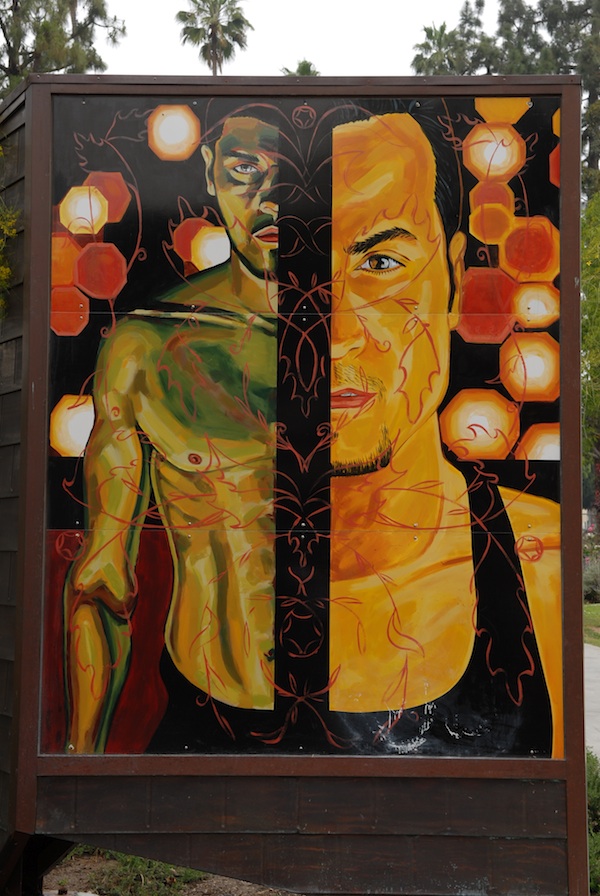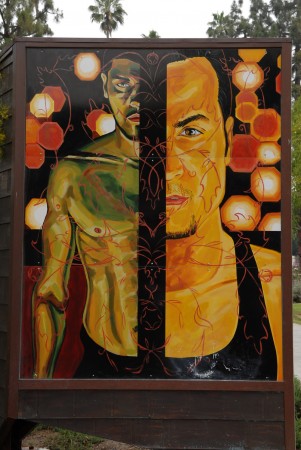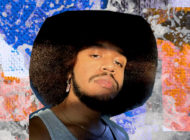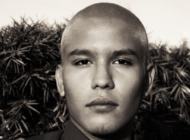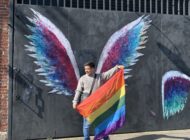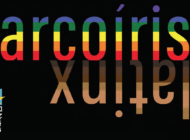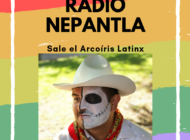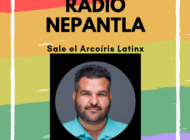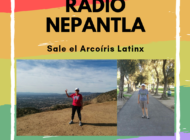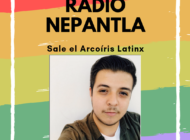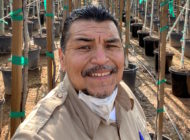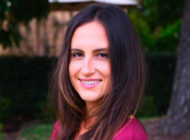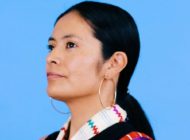From the archives:
As La Llorona is doomed to walk the earth each night searching for her children to construct a new familia, would I be destined to a similar fate? La Llorona is the apropos saint for me and other lesbian, gay, bisexual, and transgender (LGBT) Xicanas/os who are familiar with the burning sting of familial rejection, shame, and silence. She roams the Southwest attempting to reconstruct her familia, as did I.
By CSUN Student
EL NUEVO SOL, May 23, 2007
I walked into the botánica near the corner of Beverly and Vermont not knowing what to expect. I was to meet with a santero, a priest of the belief system commonly referred to as “Santería.” I chatted briefly with his wife, a santera, until he was ready for me. He called my name, and I stepped furtively into a small back room. When I stepped into that sacred space, the santero gasped. He told me to stop. He immediately asked me in Spanish, “Were you very close to your grandmother?” I responded, “Yes.” He asked, “How long has she been dead?” I answered, “Two years.” He claimed, “Her presence around you is so strong, I can almost see her behind you.” He then began to commune with her to assure her that he would do me no harm. Through his reading of the caracoles, the santero claimed that I did not have any use for God—my grandmother’s spirit was all the protection I would ever need.
“But it should begin in El Paso, that journey through the cities of night. Should begin in El Paso, in Texas. And it begins in the Wind…”
—John Rechy
City of Night
“Mama A,” I called her. A simple name for an extraordinary woman. My maternal grandmother. My protector. My hero. I was her first grandchild and the replacement to my grandfather whom she had lost two years earlier. One sunny but cold and blustery day in Ysleta, Tejas, I became extremely ill. Those who are familiar with the West Texas dust storms know that the wind exposes your flesh and cuts to your very soul. My mother rushed me to the hospital—I was diagnosed with leukemia. The doctors were blunt with my mother, “There’s nothing we can do. Make him comfortable until he dies.” My mother brought me to my grandmother’s home; a small, comfortable adobe house built by my grandfather several decades earlier and situated a mile north of “the border.” I was to spend my final few hours in the womb of my grandmother’s hearth. My mother explained the situation to “Mama A” and cried herself to sleep. My grandmother, however, was not about to relinquish her first grandchild to La Muerte or God. As were her numerous sisters, my grandmother was skilled in the ways of the curandera. While my mother slept, my grandmother “cured” me. What she actually did remains a mystery, but my mother awoke to find me sleeping peacefully in my crib. She thought I had slipped into the next phase of existence, but my grandmother assured her that I was going to be fine. Skeptical but hopeful (no one ever dared to doubt my grandmother’s will), she rushed me to the hospital again. The doctors were flabbergasted. They could not believe I was the same child who lay on the porch of Death’s door earlier that day. There was no sign of the disease, and I have had no reoccurrence of the affliction. However, thirty-four years later, La Muerte and God are still vying for my soul, but “Mama A,” even in Death, refuses to surrender my corporal essence from this existence.
“Unnatural desire is a contradiction in terms; downright nonsense. Desire is an amatory impulse of the inmost human parts.”
—Thomas Cannon
Ancient and Modern Pederasty Investigated and Exemplified, published in 1749 and considered to “be the first substantial treatment of homosexuality ever in English.”
El Paso, Tejas, 1978. I am a five-year-old Xicano. I walk into an empty living room. The television is on, and the program catches my attention. It is a documentary about the burgeoning gay community in San Francisco. I am riveted to the television. I don’t know exactly what it is I am looking at, but I can relate to it somehow. I see two men with their arms around each other, and I somehow know that this is my fate. I didn’t even know what sex was until I was twelve, but I knew I was not destined for the traditional husband/wife scenario. Did this television program “make” me gay? The possibility of this is laughable. However, I am absolutely convinced I was born with my sexual orientation and that I choose to live an open life. My journey towards self-acceptance and self-love as a proud queer Xicano is long, arduous, tragic, and comical. The acceptance and love of my family have come at a very high price, and they are still conditional.
“Just as Jews are asked to never forget their Holocaust I implore all gay people never to forget our holocaust and who caused it and why. Ronald Reagan did not even say the word “AIDS” out loud for the first seven years of his reign.”
—AIDS activist Larry Kramer
I “came out” amidst the queer death chambers of the 1980s, commonly known as the Reagan era, when the HIV/AIDS crisis was decimating the gay community. I was in the eighth grade and was enrolled in a Catholic confirmation class. During one class, I scrounged up the courage to question the Catholic Church’s rigid stance towards the gay community. Naturally, my confirmation teacher instructed the class to open their bibles to the Old Testament, Leviticus, to be exact. She ordered me to read the passage stating that a man who lies with another man as he would with a woman was an abomination. Of course, she did not contextualize this verse. She said any gay person who acted upon their “unnatural” desires would be condemned to Hell. Her gaze never left mine when she said this. After class, I questioned her privately. I came out to her indirectly, and she reiterated my fate if I ever acted upon my sinful yearnings. Every night for a week, I cursed God for instilling this torturous, burning desire within me. All I could think about was having some sort of intimate contact with another male. Nor could I stop dwelling on my eternal damnation. The night before my next confirmation class, I attempted to take my own life for an innate quality that I hadn’t even acted upon—I was fourteen. After I had swallowed nearly a full month’s supply of Xanax, clarity began to sink in. My will to live compelled my body to vomit the potentially lethal narcotic. Again, I damned God and my confirmation teacher. The next morning I refused to attend another class. I did not give my mother the reason, and I made the decision to cast off my self-imposed shame.
“Prefiero morir en pie, que vivir en rodillas.”
—Emiliano Zapata
Throughout high school, I existed in the shadows and internalized my sexual angst. Academically, I achieved fairly high grades, and I graduated in the top 5% of my class. I also earned a scholarship to a prestigious university in Tejas. During this tumultuous time, the issues regarding my sexuality resurfaced when I forced my mother to accept my jotería; returning to a life of sexual silence was not an option. Either I lived my life on my own terms, or I would have no life at all. Her response to my ultimatum, as predicted, was that I would no longer be her son or a part of her life. Soon thereafter, I was living on the streets of El Paso. I began to prostitute myself for both tangible and intangible sustenance. The money and sex I received from countless strangers were a cheap substitute for the love and acceptance I craved from my family. The time I spent sleeping in alleyways, on park benches, and in sleazy motels was a living hell. But, I am proud that I did not retreat back into the closet, although my sexual freedom came at an extremely high price.
The nights I wandered the desolate streets of El Paso, I seriously considered sacrificing myself to La Llorona by jumping into one of the city’s numerous canals. Surely, she would accept me. La Llorona would be my new patron saint—the one of freaks, faggots, dykes, and other outcasts. Since my own mother had cast out her only son into the cold night, La Llorona would wrap me in her rebozo, comfort me, stroke my hair, and sing me a lullaby as I cried in anguish.
Was it she who was howling through the wind that day I was supposed to die as an infant?
As La Llorona is doomed to walk the earth each night searching for her children to construct a new familia, would I be destined to a similar fate? La Llorona is the apropos saint for me and other lesbian, gay, bisexual, and transgender (LGBT) Xicanas/os who are familiar with the burning sting of familial rejection, shame, and silence. She roams the Southwest attempting to reconstruct her familia, as did I. Familia is one of the major tenets of Xicanismo, one upon which we base our identities. When our familia rejects us because of our jotería, we wander through a liminal state in an attempt to reconstruct our identities. Many years later, I came to an epiphanous moment and concluded that the concept of familia does not revolve around blood; this was the first step in my identity reconstruction. Is this how Juan Diego felt when he witnessed the apparition of la Virgen de Guadalupe? Not coincidentally, the slang term for a gay or lesbian is “family.” The word is both singular and plural. They’re family=They’re queer. He’s family=he’s queer. We construct our new familias in order to gain full acceptance; even if we do “come out.” Our blood families often do nothing more than tolerate us. This “half-in, half-out” status is not much better than the closet. Our partners are relegated to the “roommate” or “friend” category and, often, are not welcomed at all. Homophobia harms us through silence and emotional distance.
Many times, my “clients” did not want to use condoms, and I could only comply. Those nights of alcohol and sex are now a distorted and drunken blur. I often awoke in a stranger’s bed with no memory of the previous night’s activities. Several older, well-to-do men wanted me to be their “houseboy,” but this is code for sexual slave. I prefer not to remember the details, but I carry a constant reminder of that time. I seroconverted later that year—1993. I would forever carry the faggot scarlet letter, “A,” (for HIV/AIDS) as part of my identity. I responded to the news with little, if any, emotion. Afterwards, I descended into an orgiastic underworld of drunken nights and anonymous trysts. I discovered adult bookstores and bathhouses; this subculture simultaneously became my church and my opiate. On a nightly basis, I conducted my own ritual mass, and the mysterious power of transubstantiation ran through my veins. I willingly offered my communion, and my congregants piously and enthusiastically accepted it. As much physical pleasure as I experienced, I was also motivated by vengeance. I never warned any of my sexual partners of my health status. It was easy to rationalize. I figured that anybody willing to engage in unprotected sex in such places would be doing so at their own risk. Bathhouses and sex clubs became my sanctuary from the rejection of my family and my future health complications. I did not know how much time I had left, and I wanted to take as many people down with me as I could. I’ve had sexual encounters with countless men, but if my partners had been women, would anyone question my behavior? More likely, I would be labeled as a stud, un macho. But because I desire men, my sexual acts are categorized as unnatural and deviant.
Cardinal Alfonso Lopez “Trujillo, President of the Vatican’s Pontifical Council for the Family, called on governments to urge people not to use condoms.”
—Chioma Obinna
“HIV/AIDS: Catholic Church in Condom Palaver.”
http://www.actupny.org/reports/vatican_nyc.html
I was also motivated by vengeance against the Catholic Church. The aforementioned incident with my confirmation teacher left an indelible mark of shame and rage upon me. Every time I engaged in anonymous sex in the back of an adult bookstore or in a bathhouse, I felt a part of my Catholicism was evaporating. Most bathhouses contain a “maze” or a “dark room”. You literally enter at your own risk. You walk through a pitch-black room, and hands, tongues, and other body parts envelop you in a sensory overload. In these moments, I began to commune with my new God—the one of sheer hedonistic pleasure. I medicated my pain with alcohol and meaningless sex. I thought nothing of myself or of other people. I abused myself in this manner for five years.
“I will not be shamed again. Nor will I shame myself.”
—Gloria Anzaldúa
Borderlands/La Frontera: The New Mestiza
Since that fateful night of my attempted suicide nearly twenty years ago, I have tried to live by Anzaldúa’s testimony and to teach heterosexual Xicanas/os about the pain homophobia and heterosexism cause in their LGBT hermanas/os. As painful as it is, I must tell my story in order to remove the stigma surrounding same-sex desire. It is imperative that we initiate a dialogue with our heterosexual hermanas/os at an early age in order to weave our personal trenzas—our jotería and our Xicanismo—in a healthy, positive fashion. The silence and pity I encounter from my familia are as deadly as the virus coursing through my veins.
Silence=Death. Action=Life.
—ACT UP! Slogan
There is no need to “create space” for me in the Xicana/o community; I am intrinsically part of the community. I now demand that my gente move beyond the mere tolerance of our lives; a rash is tolerated. However uncomfortable my sexuality and my health status are for the heterosexual Xicana/o community, it is imperative that we discuss this topic. It literally is a matter of life and death. According to a report published by AIDS Project Los Angeles (2004), “Hispanics represented the largest group in Los Angeles living with AIDS through July 31, 2004.” The vast majority of exposure category deals with male-to-male sexual contact. Silence truly does equal death for the queer Xicana/o community.
Desire is memory.
—Luis Alfaro
“Everybody Has a Story: Who’s Listening?”
My innate desire relegates me to a lesser status, whether or not I am “out of the closet.” When I lived in sexual silence, I was denying a substantial part of myself by inventing a false consciousness regarding my private life. Preventing the faggot mark of “M”—maricon—to be branded upon my very existence was of utmost importance if I was to keep my familia from shame. Family shame was a major motivation for me to remain in the closet as long as I did; thereby forcing me into a double life, constantly masquerading my true self.
Many times, I have had to make up trite little stories about my “roommate” and invent responses to questions such as, “Why haven’t you met the right person (of the opposite sex?)” Living an out existence with one’s family is rarely easy. My partner and I maneuver through a volatile landscape of odious scorn, condescending pity, and painful silence. Those of us who are also living with HIV/AIDS construct another wall between our emotional sanity and our familia’s patronizing compassion. My family, especially my mother, has been expecting my death for years now. Yet, I have denied her the starring role as la madre sufrida. I can envision an elaborate set in the cemetery. Surrounded by my entire familia, my mother in black, her beautiful brown face distorted from smeared makeup and hours of incessant weeping. She plays the martyr like no other Hollywood actress can. When it is time for me to return to my original mother, my hysterical mother in black assaults my casket, demanding that she be lowered into the grave with her only son. Look at me! Look at me! Yo soy la madre sufrida! He sufrido tanto por mi’jo! Llevame a mi Dios! “Mama A” and I chuckle at her histrionics, and Yemaya—the Yoruba goddess of the ocean who the santero divined as my protector orisha—provides an unexpected ocean-like, cool breeze for my other mourners, a respite from the scorching desert heat. I look back and whisper into my mother’s ear, “Ya no llores, Mamá. I am home.” Her tears begin to subside. La Llorona waves goodbye and continues the Sisyphean search for her children. I am enveloped by the energy of my protector goddesses, Yemaya, Coatlicue, Tonantzin, La Virgen, and, of course, “Mama A.” I then take one final look back at my familia—biological and otherwise—before I dissipate into the unknown, into nothing, into the next(?) cycle of existence.
“They call me La Agrado, because I have always tried to make everyone’s life more pleasant. I used to work the streets, on bridges, near the cemetery. Aside from being pleasant I am also very authentic: almond shaped eyes, 80 thousand; silicone in lips, forehead, cheeks, hips and ass, the liter costs sixty thousand pesetas…you add it up because I stopped counting. Tits? Two, I’m no monster. Seventy each, but these have been fully depreciated. It cost me a lot to be authentic, but we must not be cheap in regards to the way we look. Because a woman is more authentic the more she looks like what she has dreamed for herself.
Pedro Almodóvar’s film
Todo Sobre Mi Madre
In order to construct a healthy, positive identity, I have had to cast off any lingering shame whether or not nuestra familia is included. My desires, my loves, my sexual acts, my memories, my life should never again be a source of shame or silence. Cognizant of this dilemma, I intricately negotiate my identities in order to entwine my Xicanismo and my jotería into a beautifully woven trenza, one worthy of the fiercest drag queen’s wig. Snap!
Are flowers carried to the kingdom of death?
It is true that we go,
it is true that we go!
Where do we go?
Where do we go?
Are we dead there or do we still live?
Do we exist there again?
—Lines from a Nahuatl poem
Blood has always been my mortal enemy. My own blood, my biological family who rejected me and the cells coursing through my veins, want to erase my very existence, my very being. Where does “Mama A” fit into this? Well, she adopted my mother; therefore, she is part of the familia that I have constructed. Through it all, I have managed to survive a bout of pneumocystis carinii, the deadly AIDS-related pneumonia, the debilitating side effects of my toxic medication, my fits of depression and guilt, my recurring alcoholism, and the scornful pity of my family. A recent study declared that HIV+ people usually survive 24 years with the disease; I have lived with this virus for 14 years now. I feel guilty because I have had access to the life-saving meds that millions in other parts of the country and the world are desperate for. I am worried at the fact that the seroconversion rate for gay Xicanos and Latinos and heterosexual Xicanas and Latinas keeps increasing. However, I am no longer scared of La Muerte. Her shadow has been cast over my soul since my birth, but I have occasionally managed to steal glimpses of sunlight. Inevitably, I know my body will tire of our dance, but I will not be sad or regretful. Recently, one of my constructed familia members told me that when my spirit does cut loose from the bondage of its corporal restraints, she and my other familia will build an altar for me for Día de los Muertos. On that occasion, as my spirit is being nourished and communes with my loved ones, I will smile, take Mama A’s hand, and prepare for the long, arduous journey back into the unknown.
Related Articles:
Undocuqueer student struggles to break a double closet
Madre latina pide aceptación y respeto para hijos que se identifican con la comunidad LGBT
Tags: #PostalesU LGBTQ LGBTQ stereotypes







